- Home
- Mordecai Richler
The Street Page 5
The Street Read online
Page 5
“He won’t fall asleep.”
“You watch him, Sam.”
“A fat lot of good prayers will do her now. Alright! Okay! I’ll watch him.”
My father was in a fury with Segal.
“The way he goes after the apricot brandy you’d think he never saw a bottle in his life before.”
Rifka and I were sent to bed, but we couldn’t sleep. My aunt was sobbing over the body in the living room; there was the old man praying, coughing and spitting into his handkerchief whenever he woke; and the hushed voices and whimpering from the kitchen, where my father and mother sat. Rifka allowed me a few drags off her cigarette.
“Well, pisherke, this is our last night together. Tomorrow you can take over the back room.”
“Are you crazy?”
“You always wanted it for yourself, didn’t you?”
“She died in there, but.”
“So?”
“I couldn’t sleep in there now.”
“Good night and happy dreams.”
“Hey, let’s talk some more.”
“Did you know,” Rifka said, “that when they hang a man the last thing that happens is that he has an orgasm?”
“A wha’?”
“Skip it. I forgot you were still in kindergarten.”
“Kiss my Royal Canadian –”
“At the funeral, they’re going to open the coffin and throw dirt in her face. It’s supposed to be earth from Eretz. They open it and you’re going to have to look.”
“Says you.”
A little while after the lights had been turned out Rifka approached my bed, her head covered with a sheet and her arms raised high. “Bouyo-bouyo. Who’s that sleeping in my bed? Woo-woo.”
My uncle who was in the theatre and my aunt from Toronto came to the funeral. My uncle, the rabbi, was there too.
“As long as she was alive,” my mother said, “he couldn’t even send her five dollars a month. I don’t want him in the house, Sam. I can’t bear the sight of him.”
“You’re upset,” Dr. Katzman said, “and you don’t know what you’re saying.”
“Maybe you’d better give her a sedative,” the rabbi said.
“Sam, will you speak up for once, please.”
Flushed, eyes heated, my father stepped up to the rabbi. “I’ll tell you this straight to your face, Israel,” he said. “You’ve gone down in my estimation.”
The rabbi smiled a little.
“Year by year,” my father continued, his face burning a brighter red, “your stock has gone down with me.”
My mother began to weep and she was led unwillingly to a bed. While my father tried his utmost to comfort her, as he muttered consoling things, Dr. Katzman plunged a needle into her arm. “There we are,” he said.
I want to sit on the stoop outside with Duddy. My uncle, the rabbi, and Dr. Katzman stepped into the sun to light cigarettes.
“I know exactly how you feel,” Dr. Katzman said. “There’s been a death in the family and the world seems indifferent to your loss. Your heart is broken and yet it’s a splendid summer day … a day made for love and laughter … and that must seem very cruel to you.”
The rabbi nodded; he sighed.
“Actually,” Dr. Katzman said, “it’s remarkable that she held out for so long.”
“Remarkable?” the rabbi said. “It’s written that if a man has been married twice he will spend as much time with his first wife in heaven as he did on earth. My father, may he rest in peace, was married to his first wife for seven years and my mother, may she rest in peace, has managed to keep alive for seven years. Today in heaven she will be able to join my father, may he rest in peace.”
Dr. Katzman shook his head. “It’s amazing,” he said. He told my uncle that he was writing a book based on his experiences as a healer. “The mysteries of the human heart.”
“Yes.”
“Astonishing.”
My father hurried outside. “Dr. Katzman, please. It’s my wife. Maybe the injection wasn’t strong enough. She just doesn’t stop crying. It’s like a tap. Can you come in, please?”
“Excuse me,” Dr. Katzman said to my uncle.
“Of course.” My uncle turned to Duddy and me. “Well, boys,” he said, “what would you like to be when you grow up?”
THREE
The Red Menace
“HOW,” TANSKY wanted to know, “could he have created the whole lousy world in seven lousy days when even in this modern scientific age it takes longer than that to build one lousy house? Answer me that, big-mouth.”
Tansky, a dedicated communist, worked assiduously during elections for the Labour-Progressive candidates, canvasing for Fred Rose, and after his conviction in the Gouzenko case, nailing up posters for Mike Buhay. Buhay who, in his London days, had mixed with Clem Attlee and Morrison.
“You heard what Maurice Hartt has to say about Buhay and your party. The Labour-Progressives, he says, are as much a party as Ex Lax is a chocolate.…”
Hartt had also tripped up Buhay in the provincial legislature, asking him why he didn’t work for a living.
“Because,” Buhay had replied, “I don’t want to do anything that would contribute to the capitalist system.”
Then why, Hartt retorted, does your wife work?
“Well,” Buhay said, “somebody in the family has to earn a living.”
The regulars were tolerant of Tansky’s communism, but unresponsive.
“If you ask me,” Segal said, “all politicians are dirty crooks. Promise, promise, promise, that’s before elections. All they want to do is line their pockets.”
Not all the men were non-voters like Segal. The horse players and a majority of the gin rummy bunch unfailingly voted for the Liberal candidate.
“Aw, it just wouldn’t look good for our people to elect a commie again. You know what I mean?”
In our riding, Time ventured, the big battle was between Liberals and Communists. “Communist-voting Cartier riding, an anomaly in conservative Quebec, is heavily industrial. About 40 per cent of the voters are French Canadians. Communists make their appeal to the other 60 per cent, which includes Jewish, Ukrainian, Hungarian and Polish workers. Cartier also includes Montreal’s flophouse, red-light and underworld districts where votes go to the highest bidder.”
Well, yes, but …
The truth is Lou and some of the others voted Liberal because their sons, impecunious McGill students, were hired each time there was a federal, provincial or civic election, to go down to the cemeteries with notebooks and compile lists of all those who had died since the last census. Other students were paid to represent the dead at the polls, which, naturally enough, enraged Tansky.
“Let’s face it,” Sugarman said placatingly. “Most of them would have voted Liberal anyway.”
“It’s a typical corruption of the democratic process. So-called.”
“Look at it another way, then. In Russia there’s no problem.”
Tansky, the first of many communists I’ve known, was always extremely kind to me. When I came in on a message he slipped me a chocolate biscuit or maybe a piece of bubble gum. Only once did he demand that I commit myself politically.
“Awright,” he demanded heatedly, as I entered the store. “Ask the Hersh kid. He can tell us.”
“Gwan. What does he know?”
“Listen here,” Tansky said, “do you study Canadian history at your lousy school?”
“Sure.”
“Tell me what you know about the Riel rebellion?”
“We haven’t come to that part yet.”
“That doesn’t surprise me. Now tell me something else. What does it say in your book? That the Indians were lied to, cheated, and exploited left, right, and centre by lousy imperialist adventurers like Jacques Cartier or that the so-called noble explorers saved Canada from the savages?”
“It says that Jacques Cartier was a hero. LaSalle too. It says they were very brave against the Indians.”
“You see, at the age of eleven they’re already stuffing their heads with capitalist propaganda. I’ll bet there’s nothing in their lousy book about the fortunes those bringers-of-Christianity made on the fur market.”
Although I liked Tansky enormously, there were others, among them my uncles, who were hostile because he defiantly ate pork and remained open for business on Yom Kippur. Our family was orthodox, we disapproved of communists, but there was a certain confusion about who and what actually was red. To begin with, I was led to believe that a communist was somebody who wrung chicken’s necks rather than have them slaughtered according to the orthodox ritual. For when I saw Bernie Huberman’s mother doing just that to a chicken in her back yard I was given a straightforward explanation. “She’s a communist, a roite.”
The family downstairs turned out to be communists too and I was warned not to speak to them. They moved in around one o’clock one May night while we sat in judgment on the balcony above, eating watermelon. I had been allowed to stay up late because of the heat wave.
“You see all those little boxes they’re moving in,” Segal whispered.
“Yeah,” my father responded eagerly.
“You notice how they’re all the same size?”
“Yeah?”
“You see how they’re all very heavy?”
“Yeah. So?”
“You wait,” Segal said, rocking in his chair. “You wait, Sam.”
The next night there was a distinct and persistent rumbling downstairs and every Wednesday a panel truck came to pick up small boxes.
“They’ve got a printing press,” my father would brag to visitors. “An underground newspaper. Right downstairs from us.”
There were no self-confessed communists with me at parochial school, but once I graduated to Fletcher’s Field High there were plenty of them. Take Danny Feldman, for instance. Wiry, scornful Danny, who sat only two seats behind me in Room 41, was a paid-up, card-holding member of the Young Communist League, and so came in for lots of heckling from the rest of us. Danny retaliated by ridiculing our enthusiasm for the achievements of Maurice “Rocket” Richard, Johnny Greco, and even Jackie Robinson.
“He’s a nigger, but. I thought you stuck up for them?”
“The word is Negro. How would you like it if I called you a kike?”
“Eat shit.”
Sports was an idiotic distraction, Danny argued, a trick to take our minds off the exploitation of our working-class parents. Whether they were aware of it or not, Buddy O’Connor, Jerry Heffernan, and Pete Morin, the incomparable razzle-dazzle line, were capitalist lackeys.
Danny was adroit at bringing our teachers to the boil too. He wanted to know why our history text books made no mention of Spartacus and neglected to comment on the Allied attempt to overthrow the Russian revolution in 1919.
“You read the wrong books, Feldman,” our history teacher said.
“Yeah. Siddown you dirty red.”
“Let’s chip in and send him to Russia. Waddiya say, guys?”
Danny shouldered his martyrdom with pride. Softly, softly, he infiltrated the F.F.H.S. Cadets Corps and Students’ Council. One day Danny was a civilian and the next he was a cadet major, with access to our sub-basement arsenal; and the Students’ Council had got up a petition to demand free milk at lunch hours and a ban on the strap. All this came about whilst our interests, as we began to encourage beards and passed from grade nine to ten, shifted from Rocket Richard’s scoring ability to Lili St. Cyr’s thrilling striptease act at the Gaiety Theatre. Our latest obsession, Miss St. Cyr’s unrivalled interpretation of Leda and the Swan, did not satisfy Danny, either. “I’ve never met such a bunch of decadent jerks in my life,” he said.
“Have you seen her, but?”
“Jeez.”
“She shaves her pussy.”
“It’s art, you know. She does it to classical music.”
Danny subjected us to a scathing lecture on women’s rights. He said the striptease was merely another form of capitalist degradation and, turning on Shubiner, he asked, “How would you like to see your mother strip on stage?”
Which, considering Mrs. Shubiner’s dimensions, had the rest of us quaking with laughter.
“You’re looking for a punch in the nose,” Shubiner hissed. “I’m warning you.”
Danny and I, it developed, had something in common. Neither of us joined in when they sang God Save the King at school assemblies. Danny abhorred all kings and didn’t believe in God. I wouldn’t sing God Save the King because I was opposed to British policy in Palestine. We had something else in common too – or so I hoped. Only the other night Segal, playing gin rummy with my father, had said, “You know those communist youth clubs?”
“Yeah,” my father said eagerly.
“You know they have parties every Friday night?”
“Yeah. So?”
“Boy. Oh, boy.”
“What?”
Segal jerked his White Owl Cigar discreetly in my direction.
“Go and do your homework,” my father said.
Now when the rest of the boys in class heckled Danny, I instantly charged to his defense. “Let Danny speak his piece. This is a free country.”
“Sez who?”
“Danny never did you any harm.”
“I don’t like his dumb kisser, okay? It makes me want to puke.”
Danny and I walked home from school together and I hinted that I would be interested in meeting some guys – “and dames too,” I allowed – who took life more seriously. There were other things besides sports, I said, and I told Danny a dirty Jewish joke, hoping to lead round to the subject of girls again. It was Segal’s joke, the one that ended Bloomberg’s dead, but I got no further than telling him about this peddler, one of ours, who had a cock as big as a Coorsh’s salami, when Danny cut me short.
“You’re a chauvinist,” he said.
“No kidding? Um, is that bad like?”
“Well, it’s not good. Listen, would you be interested in going to a social on Friday night?”
“Don’t mind if I do.”
That was Tuesday. Wednesday, I hurried to Irving’s Barbershop and got a Hollywood haircut. I also allowed myself to be cajoled into a mudpack facial to remove disfiguring blackheads. Thursday, I retrieved my one-button roll sports jacket from the cleaners and bought a hand-painted tie at Morrie Heft’s. Friday, I slipped into my new suit trousers and I was ready an hour early. When Danny finally picked me up I was astonished to discover that he was wearing the same smelly old sweater and baggy trousers he came to school in every day.
There was no liquor at the party. They did have a record player, but nobody could boogie. A fuzzy-haired girl with a guitar sat on the floor and led a folk-singing session. Joe Hill and Los Quatro Generales. When it came my turn to pick a song I slipped my arm around the girl who sat next to me and asked for the one that began,
If all the girls were like Hedy Lamarr,
I’d work half as hard and get twice as far.
“Who brought that here?” somebody squealed.
“All-You-Eta,” I suggested quickly. “How’s about that. It’s a kind of gag version of Alouette. It goes All-you-eta, think of all-you-eta. All –”
“Shettup,” Danny pleaded, poking me.
“But that’s a clean one.”
“It also happens to be,” the fuzzy-haired girl said icily, “a tasteless corruption of one of our few authentic French Canadian folk songs.”
FOUR
The Main
TWO STREETS below our own came the Main. Rich in delights, but also squalid, filthy, and hollering with stores whose wares, whether furniture or fruit, were ugly or damaged. The signs still say FANTASTIC DISCOUNTS or FORCED TO SELL PRICES HERE, but the bargains so bitterly sought after are illusory – and perhaps they always were.
The Main, with something for all our appetites, was dedicated to pinching pennies from the poor, but it was there to entertain, educate and comfort us too. Across th
e street from the synagogue you could see THE PICTURE THEY CLAIMED COULD NEVER BE MADE. A little further down the street there was the Workman’s Circle and, if you liked, a strip show. Peaches, Margo, Lili St. Cyr. Around the corner there was the ritual baths, the shvitz or mikva, where my grandfather and his cronies went before the High Holidays, emerging boiling red from the highest reaches of the steam rooms to happily flog each other with brushes fashioned of pine tree branches. Where supremely orthodox women went once a month to purify themselves.
It was to the Main, once a year before the High Holidays, that I was taken for a new suit (the itch of the cheap tweed was excruciating) and shoes (with a built-in squeak). We also shopped for fruit on the Main, meat and fish, and here the important thing was to watch the man at the scales. On the Main, too, was the Chinese laundry – “Have you ever seen such hard workers?” – the Italian hat-blocker – “Tony’s a good goy, you know. Against Mussolini from the very first.” – and strolling French Canadian priests – “Some of them speak Hebrew now.” “Well, if you ask me, it’s none of their business. Enough’s enough, you know.” Kids like myself were dragged along on shopping expeditions to carry parcels. Old men gave us snuff, at the delicatessens we were allowed salami butts, card players pushed candies on us for luck, and everywhere we were poked and pinched by the mothers. Absolutely the best that could be said of us was, “He eats well, knock wood,” and later, as we went off to school, “He’s a rank-one boy.”
After the shopping, once our errands had been done, we returned to the Main once more, either for part-time jobs or to study with our melamud. Jobs going on the Main included spotting pins in a bowling alley, collecting butcher bills and, best of all, working at a news-stand, where you could devour the Police Gazette free and pick up a little extra shortchanging strangers during the rush hour. Work was supposed to be good for our character development and the fact that we were paid was incidental. To qualify for a job we were supposed to be “bright, ambitious, and willing to learn.” An ad I once saw in a shoe store window read:

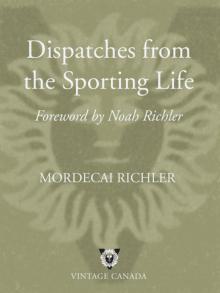 Dispatches From the Sporting Life
Dispatches From the Sporting Life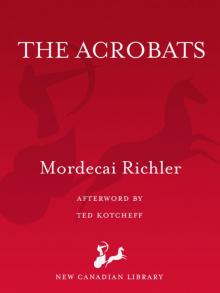 The Acrobats
The Acrobats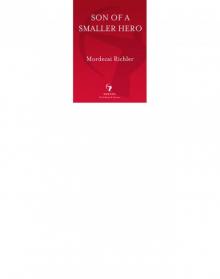 Son of a Smaller Hero
Son of a Smaller Hero Jacob Two-Two-'S First Spy Case
Jacob Two-Two-'S First Spy Case Jacob Two-Two Meets the Hooded Fang
Jacob Two-Two Meets the Hooded Fang Jacob Two-Two and the Dinosaur
Jacob Two-Two and the Dinosaur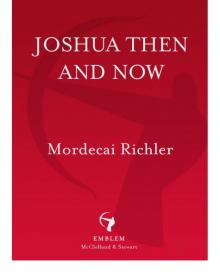 Joshua Then and Now
Joshua Then and Now Solomon Gursky Was Here
Solomon Gursky Was Here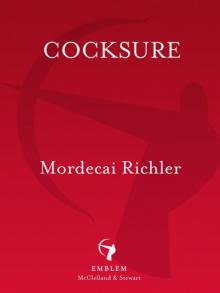 Cocksure
Cocksure The Street
The Street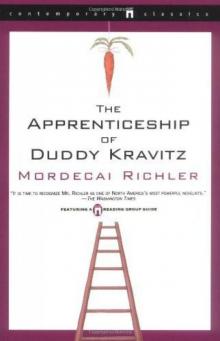 The Apprenticeship of Duddy Kravitz
The Apprenticeship of Duddy Kravitz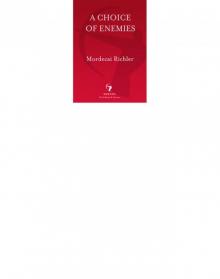 A Choice of Enemies
A Choice of Enemies Barney's Version (Movie Tie-In Edition)
Barney's Version (Movie Tie-In Edition)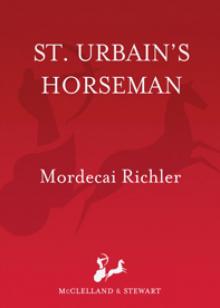 St. Urbain's Horseman
St. Urbain's Horseman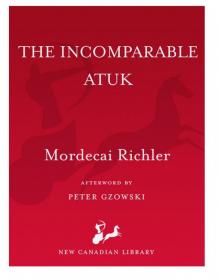 The Incomparable Atuk
The Incomparable Atuk Barney's Version
Barney's Version